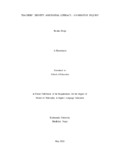
Please use this identifier to cite or link to this item:
https://hdl.handle.net/20.500.14301/421| Title: | Teachers’ Identity and Digital Literacy: A Narrative Inquiry. A |
| Authors: | Deuja, Ramita |
| Citation: | Deuja,R.(2024).Teachers’ identity and digital literacy: A narrative inquiry. |
| Issue Date: | May-2024 |
| Publisher: | Kathmandu University School of Education |
| School: | SOED |
| Department: | DOLE |
| Level: | M.Phil. |
| Program: | Master of Philosophy (MPhil) in English Language Education |
| Abstract: | Teaching and learning scenarios after corona pandemic are believed to have changed. Teaching professionals who learned to use digital platforms for teaching during the pandemic continued when it went into physical mode. English language teaching is expected to change as the teachers integrate digital literacy skills in language teaching. This research explores the stories of English language teachers who literate themselves to grow their professional skills. The prime objectives of this research study were to narrate teachers’ professional- identity and to explore how English language teachers constructed their identity through digital literacy skills. To accomplish my objectives, I chose an interpretive paradigm. I employed narrative inquiry as a research method to generate information from the participants about their experiences of a professional journey and integration of digital literacy skills for language teaching and learning. Four English language teachers were my research participants. I took semi-structured interviews, prepared field notes, and managed to have casual conversations to generate information. The information generated from the semi-structure interview was recorded, transcribed, and coded to generate themes in the making-meaning and analysis process. Finally, the themes were interpreted employing Wenger (1998) social theory identity formation. The study result revealed that a teacher’s professional identity is not fixed; it keeps changing in circumstances. Teachers starts the profession with the identity of ‘a teacher’. Over time professional roles and the day-to-day activities, they perform to address the situation change their identity. Analyzing the stories of language teachers, I found that teachers using their digital literacy skills to teach language shifted their teaching practice and changed their identity from traditional teachers to modern techno friendly teachers. Apart from this teachers’ digital literacy changed their academic status; most of the teachers are found pursuing higher degrees through digital mode. The study participants revealed that their digital literacy skills provided them with wider opportunities in the professional space. On top of all, integrating digital technology motivated the digital-friendly learner and improved their language learning. The study concludes that digital literacy skills are crucial to all teachers in the 21st century skill as they provide ample opportunity to create and use local materials and resources to change deep- rooted teaching methods and change the teacher’s identity. The study results are expected to contribute to the policy-making body integrating technology in classroom teaching, curriculum developers, and designers to plan the curriculum to make it digitally friendly so that the learners and teachers would study with full interest. Besides, it contributes to language teachers and teacher educators who want to survive in the profession familiarizing them with digital literacy skills that are considered crucial to be a teacher. |
| URI: | https://hdl.handle.net/20.500.14301/421 |
| Appears in Collections: | Dissertation |
Files in This Item:
| File | Description | Size | Format | |
|---|---|---|---|---|
| Deuja (2024) Teacher Identity.pdf | 1.01 MB | Adobe PDF |  View/Open |
Items in DSpace are protected by copyright, with all rights reserved, unless otherwise indicated.